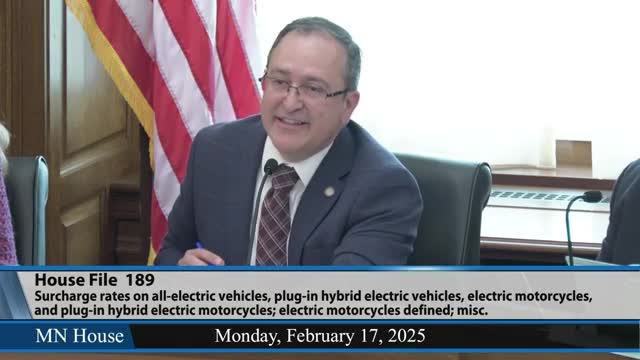Minn. committee hears House File 189 to raise EV registration fee; amendment fails on 7-8 roll call
Get AI-powered insights, summaries, and transcripts
Subscribe
Summary
A Minnesota House committee heard testimony on House File 189, a bill that would raise annual electric vehicle registration fees to roughly $137 to align EV contributions with gasoline-powered vehicles, Representative Zalesnikar told committee members.
A Minnesota House committee heard testimony on House File 189, a bill that would raise annual electric vehicle registration fees to roughly $137 to align EV contributions with gasoline-powered vehicles, Representative Zalesnikar told committee members.
The bill, Zalesnikar said, is “really a parity bill to the existing gas tax” and seeks to replace some highway and bridge revenue lost as motorists switch to electric vehicles. Zalesnikar said Minnesota currently has 53,356 electric vehicles registered and that his calculation — using an average Minnesotan driving distance of 13,957 miles — produced a proposed fee of $137 per year. “I didn’t round up. I did exact straight math by the data,” he said.
Why it matters: The state’s roads and bridges have been funded largely by fuel taxes; as the vehicle fleet electrifies, those per-gallon revenues decline. Sponsors and supporters say a higher EV registration fee would maintain a user-fee link to road funding. Opponents say EV drivers already contribute through higher sales taxes and tab (licensing) fees and that raising registration fees would discourage adoption and not fix underlying roadway funding gaps.
Representative Kraft offered an A1 amendment that she described as a bipartisan compromise tied to Minnesota’s greenhouse-gas vehicle-miles-traveled (VMT) policy. Kraft said the amendment would reduce the EV fee compared with the sponsor’s proposal, lower the fee for plug-in hybrids, remove fees on motorcycles, deposit EV-fee revenue into a mitigation account tied to the state’s VMT policy, and eliminate proposed general fund transfers. She also proposed changing the bill’s automatic inflation increases from annual adjustments to increases every two years rounded to the nearest $5.
Kraft framed the mitigation account as a tool to fund measures that would offset increased greenhouse-gas emissions when specific road projects increased vehicle miles traveled. She said the account would “sweep” unused funds back into the Highway User Tax Fund so money would ultimately remain available for roads and bridges if not used for mitigation.
Representative Olson criticized the amendment’s revenue impact and questioned whether modest registration fees can meaningfully fund climate mitigation. “An extra $50 is going to be woefully insignificant,” Olson said, noting larger tab and tax items are bigger factors in vehicle purchase costs.
Fresh Energy testimony: Nick Hague, testifying on behalf of the nonprofit Fresh Energy, told the committee the Minnesota Department of Transportation’s November 2024 report on highway-user tax distribution shows EVs already contribute sufficient revenue through sales taxes and tab fees to offset lost gasoline taxes. Hague said the distribution report found EVs represent about 1% of on-road vehicles in Minnesota and that raising the EV registration fee to $150 would generate about $3.1 million annually but would not address the underlying causes of the state’s multi‑billion dollar roadway funding needs. “Electric vehicles already contribute sufficient tax revenue through higher sales tax and tab fees to offset the lost gasoline tax revenues,” Hague said.
Roll-call on A1 amendment: Representative Kraft moved the A1 amendment and requested a roll call. The committee recorded seven ayes and eight nays; the amendment failed on the roll call (7–8). The roll-call votes recorded during the committee were: Chair Kosnick — No; Vice Chair Myers — No; Representative Anderson — No; Representative Berg — Yes; Representative Fogelman — No; Representative Green — Yes; Representative Jones — Yes; Representative Joy — No; Representative Kraft — Yes; Representative Murphy — No; Representative Olson — No; Representative Ream — Yes; Representative Sensormura — Yes; Representative Scraba — No; Representative Tabke — Yes.
Final status: Committee leadership laid over House File 189 for further consideration; no final committee vote on the underlying bill was taken at this hearing. Chair Kosnick said he expected further discussion and that members had expressed interest in making the fees “equitable to internal combustion engines.”
Clarifying numbers and estimates discussed in the hearing: Minnesota’s current EV registration fee was cited in testimony as $75 per year; the sponsor presented a proposed fee of about $137 per year based on average miles driven; the sponsor estimated the change would raise roughly $3,000,000 by his calculations; Fresh Energy cited a MnDOT estimate that raising the fee to $150 would yield about $3.1 million annually; the transcript shows 53,356 EVs in the state per the sponsor’s remarks.
What’s next: The bill was laid over for additional committee work. Committee members indicated they expect follow-up discussion to reconcile parity with gasoline taxes, links to the state’s greenhouse-gas VMT policy, and concerns about EV adoption and revenue sufficiency.
